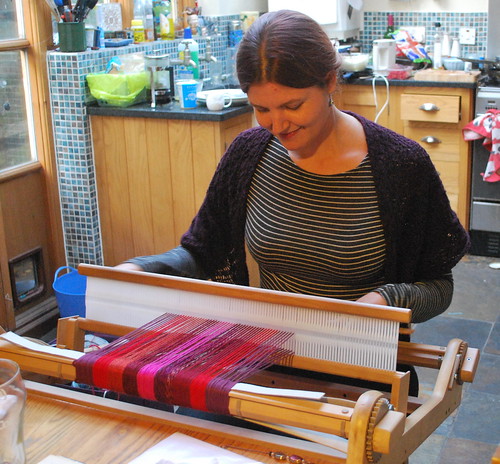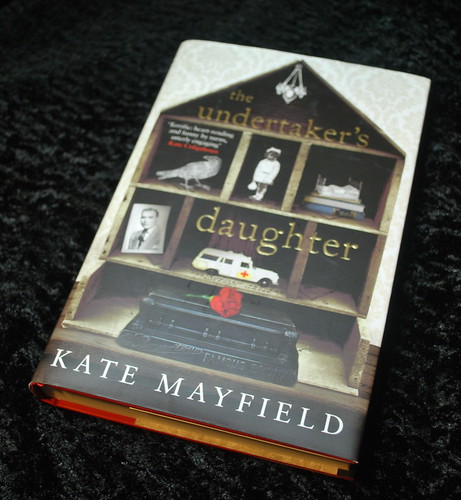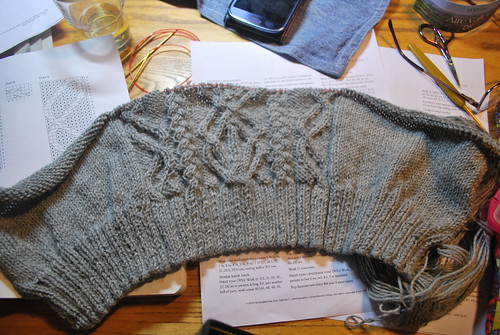Cop town, by Karin Slaughter [audiobook]. Read by Lorelei King. Oxford: Isis, 2014.
Kate Murphy, a Vietnam War widow, decides she can't just sit around waiting for her Country Club parents to pick up her bills, and joins the police in Atlanta in 1974. She pairs up with Maggie Lawson, who has a brother and an uncle in the police service, and becomes embroiled in a situation which involves Ken Lawson's partner and his family... Good reading, as ever, by Lorelei King; slightly overwrought writing, as ever, by Karin Slaugher; entertaining, and well-plotted. The sexual and racial politics of 1970s policing in the US South are particularly interesting points...
A restless evil, by Ann Granger [audiobook]. Read by Judith Boyd. [Rearsby, Leics.]: WF Howes, 2002.
A Mitchell and Markby book. While looking for a house as a pre-condition to marriage, Meredith stumbles across a corpse in the local church. And as it turns out, the house was also involved in a disappearance and murder in the past. A nicely judged book with a twist in the tail...
Blessed are those who thirst, by Anne Holt. London: Corvus, 2013.
Hanne Wilhelmsen is sent out, repeatedly, to Saturday night massacres; vast quantities of blood, with a mystery number at the centre. Meanwhile, she's investigating a particularly nasty rape. As Hanne gradually becomes aware that the cases are connected, more random facts threaten to throw her off track; and the victims are also taking action. This is more of a novella at just over 200 pages, but holds the attention...
Foxglove summer, by Ben Aaronovitch. London: Gollancz, 2014.
Fifth in the Peter Grant series. Grant's sent well out of his comfort zone into the Cotswolds to investigate the disappearance of two children. He's brought his wellies. This is an excellent follow-up to the other books in this series; particularly liked the lack of country stereotyping. Not sure it drives what seems to be the main plot arc all that far, but it's very good reading for all that.
The good, the bad and the furry: life with the world's most melancholy cat and other whiskery friends, by Tom Cox. London: Sphere, 2014.
The next in the series of these entertaining, hilarious books. If you've ever been under the delusion you've owned a cat, or recognised that a cat owns you, it's a lovely, quick, diverting book, with a cast of characters including Tom's Dad, who speaks entirely in capitals and advises everyone to look out for FOOKWITS AND LOONIES; and, of course, The Bear, a 19-year-old philosopher and mystic disguised as a small black cat.
Saturday, January 24, 2015
Tuesday, December 30, 2014
2014 books, #96-100
Dead cold, by Louise Penny [audiobook]. Read by Adam Sims. Oxford: Isis, 2006.
The rather dreadful CeCe, an incomer who has made no effort to make friends in Three Pines, is fatally electrocuted at the annual Boxing Day curling match. Armand Gamache returns to the village to discover a history of secrets and enemies, and a connection in the dead woman's past to Three Pines. This is the second of the Gamache books, and many of the same characters as before reappear; while I guessed the murderer early on, there were many twists and turns which led me to doubt my judgment. A good one to listen to at this time of year, and an excellent reading by Adam Sims.
Fury, by G M Ford [audiobook]. Read by Jeff Harding. Whitley Bay: Chivers, 2004.
Frank Corso is a pariah—a journalist once vilified for making up "facts" on a major crime story. Yet slow, sheltered Leanne Samples trusts no one but Corso to tell the world that her courtroom testimony that put Walter Leroy "Trashman" Himes on Death Row was a lie. Convicted of the savage slaying of eight Seattle women, Himes is only six days from execution, unless Frank Corso and outcast photographer Meg Dougherty into a struggle that goes far beyond right, wrong, truth, and justice. Because the lowly and the powerful alike all want Himes dead at any cost—despite startling new evidence that threatens to devastate a city once again.
The gods of guilt, by Michael Connelly. London: Orion, 2014.
Micky Haller unexpectedly gets a call to a murder case; and then discovers he's about to defend a man accused of the murder of Glory Days, a prostitute he'd known several years before as a client and friend. As his investigations continue, Micky realises he may have been responsible for what happened to Glory, and acts principally through a sense of guilt. Another excellent thriller by Connelly, with a tiny cameo appearance by Harry Bosch.
The affair, by Lee Child [audiobook]. Read by Jeff Harding. Whitley Bay: Soundings, 2011.
Finally, this one's the account of how Jack Reacher left the army. A woman has had her throat cut in a bar in Carter Crossing, Mississippi. Reacher, still an Army major, is sent undercover to investigate; and meets the local sheriff, a stunningly beautiful ex-Marine. As the case progresses, Reacher realises that if he does what the Army wants, he may not be able to live with himself, or the Army with him. An excellent book, and as ever with a great deal of humour mixed in...
The taxidermist's daughter, by Kate Mosse. London: Orion, 2014.
A book group book; this time sent by the publisher which was terribly nice of them! Sussex, 1912: and in the churchyard, a group of men gather on St Mark's Eve (April 24). Sinister birds fly out of the church, but a more sinister act is taking place while the men are distracted. Constantia Gifford, the taxidermist's daughter, is about to discover a body. This is a very sinister tale of murder, revenge and dark deeds. There are a couple of holes in the plot you could drive a coach and horses through, but it can't be faulted for atmosphere and giving a shiver down the spine...
The rather dreadful CeCe, an incomer who has made no effort to make friends in Three Pines, is fatally electrocuted at the annual Boxing Day curling match. Armand Gamache returns to the village to discover a history of secrets and enemies, and a connection in the dead woman's past to Three Pines. This is the second of the Gamache books, and many of the same characters as before reappear; while I guessed the murderer early on, there were many twists and turns which led me to doubt my judgment. A good one to listen to at this time of year, and an excellent reading by Adam Sims.
Fury, by G M Ford [audiobook]. Read by Jeff Harding. Whitley Bay: Chivers, 2004.
Frank Corso is a pariah—a journalist once vilified for making up "facts" on a major crime story. Yet slow, sheltered Leanne Samples trusts no one but Corso to tell the world that her courtroom testimony that put Walter Leroy "Trashman" Himes on Death Row was a lie. Convicted of the savage slaying of eight Seattle women, Himes is only six days from execution, unless Frank Corso and outcast photographer Meg Dougherty into a struggle that goes far beyond right, wrong, truth, and justice. Because the lowly and the powerful alike all want Himes dead at any cost—despite startling new evidence that threatens to devastate a city once again.
The gods of guilt, by Michael Connelly. London: Orion, 2014.
Micky Haller unexpectedly gets a call to a murder case; and then discovers he's about to defend a man accused of the murder of Glory Days, a prostitute he'd known several years before as a client and friend. As his investigations continue, Micky realises he may have been responsible for what happened to Glory, and acts principally through a sense of guilt. Another excellent thriller by Connelly, with a tiny cameo appearance by Harry Bosch.
The affair, by Lee Child [audiobook]. Read by Jeff Harding. Whitley Bay: Soundings, 2011.
Finally, this one's the account of how Jack Reacher left the army. A woman has had her throat cut in a bar in Carter Crossing, Mississippi. Reacher, still an Army major, is sent undercover to investigate; and meets the local sheriff, a stunningly beautiful ex-Marine. As the case progresses, Reacher realises that if he does what the Army wants, he may not be able to live with himself, or the Army with him. An excellent book, and as ever with a great deal of humour mixed in...
The taxidermist's daughter, by Kate Mosse. London: Orion, 2014.
A book group book; this time sent by the publisher which was terribly nice of them! Sussex, 1912: and in the churchyard, a group of men gather on St Mark's Eve (April 24). Sinister birds fly out of the church, but a more sinister act is taking place while the men are distracted. Constantia Gifford, the taxidermist's daughter, is about to discover a body. This is a very sinister tale of murder, revenge and dark deeds. There are a couple of holes in the plot you could drive a coach and horses through, but it can't be faulted for atmosphere and giving a shiver down the spine...
2014 books, #91-95
Bones never lie, by Kathy Reichs. London: Random House, 2014.
Tempe Brennan can't work out why she's being called unexpectedly down from Québec to her other job in South Carolina, only to meet a detective from Québec. There's a link; a killer Tempe pursued in Canada has appeared in South Carolina and seems to be killing again. While Tempe is somewhat freaked out by the idea of the killer pursuing her, all isn't the way it seems, and the story twists and turns before its final ending. I've not been very sure about the last couple of these books, but this one is definitely better than those...
The wrath of angels, by John Connolly [audiobook]. Read by Jeff Harding. Oxford: Isis, 2012.
A Charlie Parker book; I can never decide how much I enjoy these, because the supernatural is mixed into the plot so thoroughly that you can never tell what's real and what's unreal. In this one, a plane is found in the deep woods in Maine, containing a list of names. One group wants to keep the names secret; the other wants to use them as a weapon against the sinister Collector. Meanwhile, there's a beautiful but damaged woman accompanied by a young boy, who is someone Charlie has already killed...
Do no harm: stories of life, death and brain surgery, by Henry Marsh [audiobook]. Read by Jim Barclay. Rearsby, Leics.: WF Howes, 2014.
This is fascinating; an autobiography divided into chapters according to brain disease, with reminiscences of past cases and what those have told Marsh about himself and his own character. There are a lot of fairly gory details here, but also a lot of interesting human stories about the patients and their families; and Marsh's exasperation with the bureaucracy of the NHS comes over loud and clear...
Gods behaving badly, by Marie Phillips. London: Jonathan Cape, 2007.
After Alice invites her friend Neil to the recording of a spiritualist, Apollo, at the TV studios she cleans, she's given the sack. When she goes looking for private cleaning jobs, she runs into Apollo again; and his relatives Artemis, Aphrodite, Ares... The ancient Greek gods are living in a filthy Victorian house in London, and at the end of their powers; even sex has lost its power to divert. This is an extremely funny book by one of the creators of Warhorses of letters.
Death at La Fenice, by Donna Leon [audiobook]. Read by Richard Morant. [S.l.]: BBC Audiobooks, 2003.
The first of the Brunetti novels. Maestro Helmut Wellnauer is killed by cyanide in his dressing room during the interval of the opera he is conducting. Wellnauer has an interestingly complicated private life, and also many professional rivalries, so Brunetti has a large and colourful cast of suspects to interview. I guessed what had happened well before the end, but the setting and writing are good enough that this didn't matter.
Tempe Brennan can't work out why she's being called unexpectedly down from Québec to her other job in South Carolina, only to meet a detective from Québec. There's a link; a killer Tempe pursued in Canada has appeared in South Carolina and seems to be killing again. While Tempe is somewhat freaked out by the idea of the killer pursuing her, all isn't the way it seems, and the story twists and turns before its final ending. I've not been very sure about the last couple of these books, but this one is definitely better than those...
The wrath of angels, by John Connolly [audiobook]. Read by Jeff Harding. Oxford: Isis, 2012.
A Charlie Parker book; I can never decide how much I enjoy these, because the supernatural is mixed into the plot so thoroughly that you can never tell what's real and what's unreal. In this one, a plane is found in the deep woods in Maine, containing a list of names. One group wants to keep the names secret; the other wants to use them as a weapon against the sinister Collector. Meanwhile, there's a beautiful but damaged woman accompanied by a young boy, who is someone Charlie has already killed...
Do no harm: stories of life, death and brain surgery, by Henry Marsh [audiobook]. Read by Jim Barclay. Rearsby, Leics.: WF Howes, 2014.
This is fascinating; an autobiography divided into chapters according to brain disease, with reminiscences of past cases and what those have told Marsh about himself and his own character. There are a lot of fairly gory details here, but also a lot of interesting human stories about the patients and their families; and Marsh's exasperation with the bureaucracy of the NHS comes over loud and clear...
Gods behaving badly, by Marie Phillips. London: Jonathan Cape, 2007.
After Alice invites her friend Neil to the recording of a spiritualist, Apollo, at the TV studios she cleans, she's given the sack. When she goes looking for private cleaning jobs, she runs into Apollo again; and his relatives Artemis, Aphrodite, Ares... The ancient Greek gods are living in a filthy Victorian house in London, and at the end of their powers; even sex has lost its power to divert. This is an extremely funny book by one of the creators of Warhorses of letters.
Death at La Fenice, by Donna Leon [audiobook]. Read by Richard Morant. [S.l.]: BBC Audiobooks, 2003.
The first of the Brunetti novels. Maestro Helmut Wellnauer is killed by cyanide in his dressing room during the interval of the opera he is conducting. Wellnauer has an interestingly complicated private life, and also many professional rivalries, so Brunetti has a large and colourful cast of suspects to interview. I guessed what had happened well before the end, but the setting and writing are good enough that this didn't matter.
Saturday, November 22, 2014
NaBloPoMo day 22: Naming of parts
The daily blogging being completely blown, at least I can show you what I've been doing with another of this month's tasks - the NaKniSweMo cardigan.
I have pieces. All the pieces, in fact...
From top to bottom, two sleeves, two fronts and a back. The colour's actually a pale cool grey, but this is how it looks on the chair by the PC in the lamplight...
Having these sorted by the 22nd is great; but I'd really like to get the bands picked up and finished tomorrow, because it's too big to carry to work and back...
That's 76,692 stitches, at my best calculation...
I have pieces. All the pieces, in fact...
From top to bottom, two sleeves, two fronts and a back. The colour's actually a pale cool grey, but this is how it looks on the chair by the PC in the lamplight...
Having these sorted by the 22nd is great; but I'd really like to get the bands picked up and finished tomorrow, because it's too big to carry to work and back...
That's 76,692 stitches, at my best calculation...
Tuesday, November 18, 2014
NaBloPoMo day 18: In memoriam, again
It's a month of slightly grim anniversaries, it seems... Was walking past one of the memorials at King's Cross this morning, which was cordoned off, and remembered it was the anniversary of the King's Cross fire in 1987. I was at college at the time, and friends were visiting London; thankfully, they'd left before the fire started, but we stayed up for a long time listening to the radio...
In all, 31 people lost their lives underground at King's Cross that day, passengers, LUL staff and first responders among them. 100 others were injured, many of them seriously.
In some ways it feels like another era despite only being 27 years ago. Wooden escalators, for one thing. People smoking on the Tube for another. Smoking on the underground sections of the Tube had been banned for two years, and on the trains themselves for three; but smoking in the ticket halls immediately next to the escalators was still permitted and the escalators themselves were a bit of a grey area. The investigators concluded that the fire had been caused by a match falling through the side of the escalator and onto a build-up of litter and grease below; as well as by a completely new phenomenon in fire research, a flashover later termed the trench effect.
The King's Cross disaster helped to increase the safety of public transport; smoking was banned throughout the network three days after the fire; the escalators took just a little longer (the last wooden escalator was removed from Greenford station on 10 March 2014).
There are two memorials at King's Cross; the first went up in the 1990s. Later, a clock appeared above it with the upper plaque which says This clock has been given in memory of those who lost their lives in the fire at King's Cross station on 18th November 1987. From all the underground staff at sub-surface & tube stations.
The later memorial (also in the ticket hall, in the corridor which leads to St Pancras) gives the names. All the names. One victim stayed unidentified for 17 years after the fire and, after much searching including a forensic reconstruction and tracking down of the origin of a metal stent in his skull, identified as a 73-year-old homeless man from Falkirk; I'm always moved when I look at the plaque that time was also taken to carve his name in afterwards.
I'm often irked at King's Cross - at the moment, there's a hugely convoluted contraflow because the escalators replaced after the fire are being replaced again, and access to the central line is often controlled at peak times. Walking past both memorials every day should remind me of what happens when health and safety fails, and often it does.
I haven't given up completely on NaBloPoMo, but it does seem to have fallen somewhat by the wayside! Will post as I can...
In all, 31 people lost their lives underground at King's Cross that day, passengers, LUL staff and first responders among them. 100 others were injured, many of them seriously.
In some ways it feels like another era despite only being 27 years ago. Wooden escalators, for one thing. People smoking on the Tube for another. Smoking on the underground sections of the Tube had been banned for two years, and on the trains themselves for three; but smoking in the ticket halls immediately next to the escalators was still permitted and the escalators themselves were a bit of a grey area. The investigators concluded that the fire had been caused by a match falling through the side of the escalator and onto a build-up of litter and grease below; as well as by a completely new phenomenon in fire research, a flashover later termed the trench effect.
The King's Cross disaster helped to increase the safety of public transport; smoking was banned throughout the network three days after the fire; the escalators took just a little longer (the last wooden escalator was removed from Greenford station on 10 March 2014).
There are two memorials at King's Cross; the first went up in the 1990s. Later, a clock appeared above it with the upper plaque which says This clock has been given in memory of those who lost their lives in the fire at King's Cross station on 18th November 1987. From all the underground staff at sub-surface & tube stations.
The later memorial (also in the ticket hall, in the corridor which leads to St Pancras) gives the names. All the names. One victim stayed unidentified for 17 years after the fire and, after much searching including a forensic reconstruction and tracking down of the origin of a metal stent in his skull, identified as a 73-year-old homeless man from Falkirk; I'm always moved when I look at the plaque that time was also taken to carve his name in afterwards.
I'm often irked at King's Cross - at the moment, there's a hugely convoluted contraflow because the escalators replaced after the fire are being replaced again, and access to the central line is often controlled at peak times. Walking past both memorials every day should remind me of what happens when health and safety fails, and often it does.
I haven't given up completely on NaBloPoMo, but it does seem to have fallen somewhat by the wayside! Will post as I can...
Sunday, November 16, 2014
NaBloPoMo day 15: 2014 books, #86-90
Thomas Quick: the making of a serial killer, by Hannes Råstam [audiobook]. Read by Peter Noble. Rearsby, Leics.: WF Howes/Clipper, 2013.
In 1992, Thomas Quick confessed to the murder of a missing eleven-year-old boy, while Quick was receiving treatment in a secure mental hospital. Over the following nine years, Quick confessed to another 30 murders. Hannes Råstam, an investigative journalist, became fascinated with Quick's case and eventually met Quick in prison in 2008. What came out of the interviews and Råstam's investigations was, if anything, more frightening than the murderer himself, and raised questions about the Swedish legal and psychiatric systems. Råstam himself died the day after delivering the manuscript, but the ramifications of the case, and of this book, continue to be felt in Sweden. This is an absolutely fascinating book.
Burial rites, by Hannah Kent. London: Picador, 2014.
Agnes Magnúsdóttir is condemned to die for the murder of two men; before her beheading, she is boarded out on a district inspector's family. Margrét, the mother of the family, is terrified before Agnes arrives, but they gradually develop an understanding as Agnes works in the household. Agnes has been able to choose a confessor, Thorvárdur Jónsson (Tóti); what eventually comes out of their conversations is unexpected. This book gives a powerful picture of the sheer hard slog of life in Iceland in the early nineteenth century, as well as being a fascinating riff on actual events - Agnes exists in Iceland as almost a folkloric character, but very little is known of her as a women.
Who in hell is Wanda Fuca? by GM Ford [audiobook]. Read by Jeff Harding. Whitley Bay: Chivers/BBC, 2007.
The first of the Leo Waterman books. Leo is engaged by a local mobster to hunt for Caroline Nobel, an heiress with a history of extreme environmentalism. When one of the small army of homeless men Leo has assembled to help search is found dead, there's more than one case to be solved; and staying on the lawful side of the fence isn't always possible. Ford's tone is light, and funny; and works extremely well with Harding's reading... Sadly, the cassettes for this were in pretty awful state, and I missed the explanation for the title and had to Google it later (it's a Mondegreen for Juan de Fuca, an area of outstanding natural beauty off the coast.)
Still life, by Louise Penny. London: Headline, 2005.
The first of the Chief Inspector Armand Gamache books. Shock and fear tranform the village of Three Pines, Québec, when a former school teacher is found dead in a clearing near her house, an arrow through her heart. Gamache is called in with his team, and begins to get to know the people in the village, from the dead woman's neighbours Clara and Peter, both artists, to the gay couple who run the local bistrot. As Gamache investigates more thoroughly, long-dead secrets start to emerge. There's also a very interesting situation with an extremely unsympathetic policewoman who just doesn't seem to be able to get the hang of her job... Am about to start reading these in order...
Next to die, by Neil White. London: Sphere, 2014.
I think this must have come from a charity shop in Seaham Harbour earlier in the summer... Joe Parker is pleased to take a client away from his previous employer, but then finds that it's a man facing trial for the murder of his girlfriend and their baby. Meanwhile Joe's brother Sam, a detective, is investigating a related crime and the two brothers are quickly in conflict with each other. In the background, a constant presence, is the murder of the brothers' sister Ellie fifteen years before, and increasingly, fear for the little sister they still have. Really tightly plotted; I guessed what was happening 50 or so pages before the brothers did, but there's always an interest in being proved right!
In 1992, Thomas Quick confessed to the murder of a missing eleven-year-old boy, while Quick was receiving treatment in a secure mental hospital. Over the following nine years, Quick confessed to another 30 murders. Hannes Råstam, an investigative journalist, became fascinated with Quick's case and eventually met Quick in prison in 2008. What came out of the interviews and Råstam's investigations was, if anything, more frightening than the murderer himself, and raised questions about the Swedish legal and psychiatric systems. Råstam himself died the day after delivering the manuscript, but the ramifications of the case, and of this book, continue to be felt in Sweden. This is an absolutely fascinating book.
Burial rites, by Hannah Kent. London: Picador, 2014.
Agnes Magnúsdóttir is condemned to die for the murder of two men; before her beheading, she is boarded out on a district inspector's family. Margrét, the mother of the family, is terrified before Agnes arrives, but they gradually develop an understanding as Agnes works in the household. Agnes has been able to choose a confessor, Thorvárdur Jónsson (Tóti); what eventually comes out of their conversations is unexpected. This book gives a powerful picture of the sheer hard slog of life in Iceland in the early nineteenth century, as well as being a fascinating riff on actual events - Agnes exists in Iceland as almost a folkloric character, but very little is known of her as a women.
Who in hell is Wanda Fuca? by GM Ford [audiobook]. Read by Jeff Harding. Whitley Bay: Chivers/BBC, 2007.
The first of the Leo Waterman books. Leo is engaged by a local mobster to hunt for Caroline Nobel, an heiress with a history of extreme environmentalism. When one of the small army of homeless men Leo has assembled to help search is found dead, there's more than one case to be solved; and staying on the lawful side of the fence isn't always possible. Ford's tone is light, and funny; and works extremely well with Harding's reading... Sadly, the cassettes for this were in pretty awful state, and I missed the explanation for the title and had to Google it later (it's a Mondegreen for Juan de Fuca, an area of outstanding natural beauty off the coast.)
Still life, by Louise Penny. London: Headline, 2005.
The first of the Chief Inspector Armand Gamache books. Shock and fear tranform the village of Three Pines, Québec, when a former school teacher is found dead in a clearing near her house, an arrow through her heart. Gamache is called in with his team, and begins to get to know the people in the village, from the dead woman's neighbours Clara and Peter, both artists, to the gay couple who run the local bistrot. As Gamache investigates more thoroughly, long-dead secrets start to emerge. There's also a very interesting situation with an extremely unsympathetic policewoman who just doesn't seem to be able to get the hang of her job... Am about to start reading these in order...
Next to die, by Neil White. London: Sphere, 2014.
I think this must have come from a charity shop in Seaham Harbour earlier in the summer... Joe Parker is pleased to take a client away from his previous employer, but then finds that it's a man facing trial for the murder of his girlfriend and their baby. Meanwhile Joe's brother Sam, a detective, is investigating a related crime and the two brothers are quickly in conflict with each other. In the background, a constant presence, is the murder of the brothers' sister Ellie fifteen years before, and increasingly, fear for the little sister they still have. Really tightly plotted; I guessed what was happening 50 or so pages before the brothers did, but there's always an interest in being proved right!
Wednesday, November 12, 2014
NaBloPoMo day 12: Nearly halfway. Ish.
So, other than attempting to blog every day, one of the other things I'm trying to do this month is knit a sweater. Or in this case, a cardigan.
As of last night, I had a back, a sleeve and the ribbing for another sleeve. In theory, that means I'm halfway. In practice, there's all the sewing up and picking up for bands to do, and that's a real pig. On the other hand, if I were knitting in one piece from the top down, it would long ago have got to the stage where I'd have to be hauling a backpack around, so the sewing up is a necessary evil.
It's not the most exciting garment in the world; but here it is so far.
The gory details of the pattern, yarn etc. are in Day 1's post so I won't repeat them here. This represents 39,524 stitches, at nearest reckoning; onwards with the fronts now, with the second sleeve as knitting-group knitting as it needs very little concentration...
As of last night, I had a back, a sleeve and the ribbing for another sleeve. In theory, that means I'm halfway. In practice, there's all the sewing up and picking up for bands to do, and that's a real pig. On the other hand, if I were knitting in one piece from the top down, it would long ago have got to the stage where I'd have to be hauling a backpack around, so the sewing up is a necessary evil.
It's not the most exciting garment in the world; but here it is so far.
The gory details of the pattern, yarn etc. are in Day 1's post so I won't repeat them here. This represents 39,524 stitches, at nearest reckoning; onwards with the fronts now, with the second sleeve as knitting-group knitting as it needs very little concentration...
Tuesday, November 11, 2014
NaBloPoMo day 11: Acts of remembrance

I went to the Parliamentary remembrance service today at Westminster Abbey; everyone who works on the Parliamentary Estate was invited to apply for tickets, and it felt like something I should do. On the way, I walked through the garden of remembrance in the Abbey gardens.

So many little crosses, all with different handwriting on them. Not all for the Great War; I spotted one from the Falklands, one from Suez.
Reminders that people from all over the Empire/Commonwealth travelled huge distances to fight and die for a country they might never have visited,
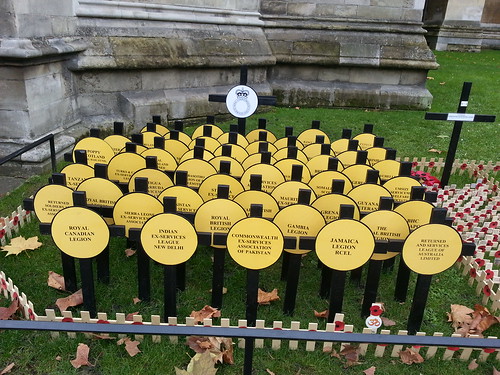
and that those who stayed at home weren't safe either.
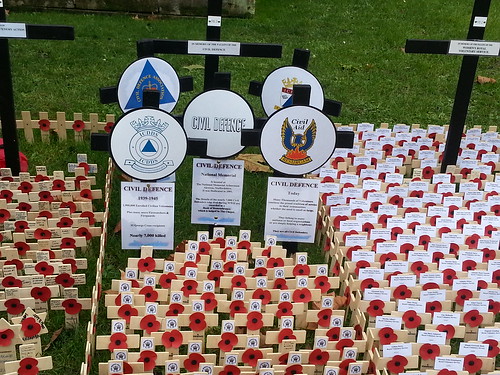
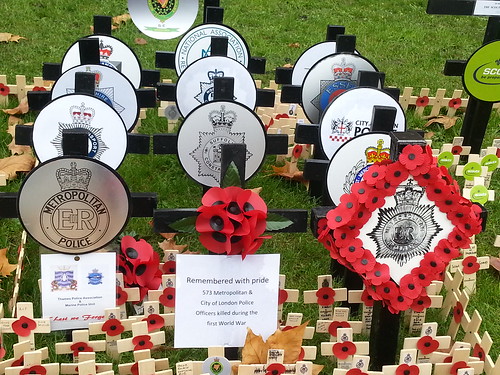
From the first words of the service - We gather today as those to whom much has been given, and from whom much is expected - it was a commemoration of duty and service. After the two minutes' silence (which fell exactly after the anthem; I have no idea how many times someone must have rehearsed that; it has to be the one set of pips you'd never wish to crash) there was the Last Post and Reveille, a prayer, and then a very strange and beautiful thing - the "trench" cello played by Steven Isserlis. It was a quiet, muted sound (my seat was only about 3 metres from the little platform they'd rigged up), but gorgeous; the idea of this object from the trenches still sounding out its song (in this case the Sarabande from Bach's Cello Suite no. V) was astonishing.
Walking past the Tomb of the Unknown Soldier on the way out, people were taking off their paper poppies and scattering them over the inscription, creating a carpet of flowers. Emerging blinking into the sunlight, the first person I saw was Baroness Williams, talking animatedly; it seemed entirely right that the daughter of Vera Brittain should still be around, still intensely engaged, still making a point.
Monday, November 10, 2014
NaBloPoMo day 10: Tangled web
The observant will notice that Day 9 is missing. I have no idea how I failed on Day 9; I was at home all day, and after a small amount of emergency fact-checking in the morning, it was all quite relaxing... And somehow, I just forgot. So weird.
But I was never interested in the whole prize-winning thing anyway; so I'm just going to dust myself off...
Anyway; the title of this tells you it's about weaving... Here's a representative heap of this year's weaving; scarves, mainly.
When I got my loom for Christmas in 2011, I thought I'd be sick of plain weave after a few months, and heading off for more complicated stuff. Which I now realise is the equivalent of saying "oh, that garter stitch, I'm way past that"... In the same way as spinning ("look! I've turned this bundle of fibres into useable yarn!") and knitting ("look! I've turned this continuous thread into something I can wear!") are miraculous, weaving of any sort is too. I love the way you can plan part of it (you can't wing a warp - it's there and it'll shape your project) but then do a bit of improvisation once you've started...
I've started corrupting others. Here's Kat. She came over for lunch and weaving, and managed to confect about 60% of the red scarf in the pile above in the course of the day. (She's pretty much omnicompetent though - don't be scared if it takes you longer)...
And also, as it's Happy Berlin Wall Destruction Week, have a video.
But I was never interested in the whole prize-winning thing anyway; so I'm just going to dust myself off...
Anyway; the title of this tells you it's about weaving... Here's a representative heap of this year's weaving; scarves, mainly.
When I got my loom for Christmas in 2011, I thought I'd be sick of plain weave after a few months, and heading off for more complicated stuff. Which I now realise is the equivalent of saying "oh, that garter stitch, I'm way past that"... In the same way as spinning ("look! I've turned this bundle of fibres into useable yarn!") and knitting ("look! I've turned this continuous thread into something I can wear!") are miraculous, weaving of any sort is too. I love the way you can plan part of it (you can't wing a warp - it's there and it'll shape your project) but then do a bit of improvisation once you've started...
I've started corrupting others. Here's Kat. She came over for lunch and weaving, and managed to confect about 60% of the red scarf in the pile above in the course of the day. (She's pretty much omnicompetent though - don't be scared if it takes you longer)...
And also, as it's Happy Berlin Wall Destruction Week, have a video.
Saturday, November 08, 2014
NaBloPoMo day 8: Tale of two books, part 2
Went to an excellent event on Thursday night at Waterstones Cambridge, having seen an ad on Twitter; Kate Mayfield, talking partly about her new book The undertaker's daughter
and partly about the Gothic tradition in Southern literature. (And there was bourbon, and cheese biscuits made by the author from a recipe in Southern Living, and peach cobbler and pecan pie made by one of Waterstones's staff...)
The undertaker's daughter is an autobiographical memoir of childhood about growing up in a funeral home in Kentucky; Kate read a couple of extracts. One, about a classmate who drowned in a swimming pool, had powerful resonances the characters in Wendy Cope's Tich Miller and Charles Causley's Timothy Winters; the other looked at fear, and the absence of fear, in the face of death.
Kate's talk also took in the wider aspects of Southern Gothic; the idea that there's a constant feeling of being haunted, and some of the causes: religious hysteria, family secrets, violence; the sundrenched wide skies but the feeling of confinement into small towns with small-town expectations and the further confinement into the domestic environment. She also touched on the slave past - in the small town she talks about, there was a lynching of four innocent black men in 1908 - and the weight of history. It was a really interesting talk, and there were some good questions. The book isn't out in the US yet and Kate has genuine worries about taking a book tour into the South because of the themes discussed and how people may react. I haven't started the book yet but am really looking forward to reading it, as someone who can't decide whether To kill a mocking-bird or gods in Alabama is her favourite novel.
The undertaker's daughter is an autobiographical memoir of childhood about growing up in a funeral home in Kentucky; Kate read a couple of extracts. One, about a classmate who drowned in a swimming pool, had powerful resonances the characters in Wendy Cope's Tich Miller and Charles Causley's Timothy Winters; the other looked at fear, and the absence of fear, in the face of death.
Kate's talk also took in the wider aspects of Southern Gothic; the idea that there's a constant feeling of being haunted, and some of the causes: religious hysteria, family secrets, violence; the sundrenched wide skies but the feeling of confinement into small towns with small-town expectations and the further confinement into the domestic environment. She also touched on the slave past - in the small town she talks about, there was a lynching of four innocent black men in 1908 - and the weight of history. It was a really interesting talk, and there were some good questions. The book isn't out in the US yet and Kate has genuine worries about taking a book tour into the South because of the themes discussed and how people may react. I haven't started the book yet but am really looking forward to reading it, as someone who can't decide whether To kill a mocking-bird or gods in Alabama is her favourite novel.
Friday, November 07, 2014
NaBloPoMo day 7: London gloaming
I was going to talk about last night's wonderful Waterstones event in the second half of the book theme, but I'll do that tomorrow. For tonight, just a couple of London photos.
I always try to get the 11 bus from Westminster to Liverpool Street on a Friday night - the 1645 train out of King's Cross is the Train from Hell and only gets worse after Cambridge, and the 1707 from Liverpool Street is infinitely more civilised; in addition, the multiple M&S branches in Liverpool Street and the Huge Boots Branch are all very useful.
I was on one of the new Routemasters; they're... interesting. Love the return to being able to get on and off at the back; but they do look a little bit as if they've been designed by an alien Duplo-based lifeform. Here, there's a 24 in front of us in the same design.
The bus wasn't meant to be the focus of the picture; Nelson had a particularly Turneresque sky to set him off this evening, as the sun set.
And then we headed along the Strand towards Fleet Street (the two streets are divided by a dragon in the middle of the road. As you do.)
The building on the left is the Royal Courts of Justice, another wonderfully bonkers Victorian Gothic edifice. With the light, it all looked a little bit like fairyland. In another couple of weeks it'll be dark while I'm doing this journey, so making the most of it while I can.
Another reason to be cheerful was having lunch with an old friend who was in the area; and is likely to be in the area a lot more from now on because of a new job. So while I was shattered this morning, and am still behind with absolutely everything, I'm heading into the weekend in an unusually positive frame of mind. About to try and get chores done now to start the weekend well...
NaBloPoMo day 6: Tale of two books, part 1
I finished this book today, and I loved it. So much so that I'll read it again to condense the review into the usual format.
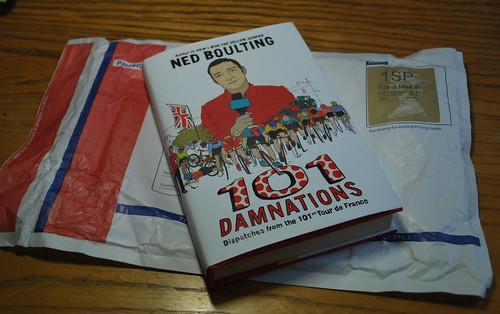
A big chunk of this year's fun was wrapped up in the Tour de France (knitting element of this to follow), and Ned Boulting, Chris Boardman, Matt Rendell and Gary Imlach were a huge part of that. And this year the race-as-billed was just weird - Cav going out so badly at possibly the most important stage of his life, at least in his opinion; Froome pulling up at a completely undistinguished roundabout in the Nord in the pouring rain (while everyone wondered about Wiggins); then Contador; headless teams rushing around all over the place... This book attempts to capture Ned Boulting's memory of the race, while doing an awful lot more besides.
So there's the recounting of the race, which is great; but sort of secondary as everything somewhat blurs and Nibali becomes dominant. If you want that though, you'd go to the Tour website and look at the stats...
I'm going to insert one of my photos from near the start of the Cambridge-to-London stage here, because it looks almost like a sports photographer's with the riders in focus and the crowds not. And because I turned up.

There's also the remembering of the absurdities of the race delivered in the highlights and the superb, rambling podcasts; the Cameraman's Wandering Thumb; nearly being run over by Norberts while trying to deliver a podcast; Chris Boardman's precision/grumpiness combo...
The third element is some history; both small elegies to the cyclists retiring this year (David Millar - this bit made me cry - Jens Voigt with the mystifyingly-pronounced surname...) and people much further back but within the living memory of some (Gérard Saint)... Then there are the interviews with people still intimately involved with the race, like Peta Todd, wife of Mark Cavendish, who gives a pretty frank account of the difficulties of living with a man whose joy and despair is measured in split-seconds.
The fourth is the affection and commitment to the race, and its utter absurdity, from the publicity caravan to the Italian official attempting to explain new rules using a human version of Google translate; the hysteria of being utterly knackered and completely wound up and still having to talk to people in a multitude of languages...
And the fifth is a deep, complicated, affectionate love of France, from wandering the aisles of an enormous Carrefour staring at the huge display of tinned peas and carrots and then just buying pistachios and wine to take back to the hotel, to a discussion of the construction of stools (the furniture kind) in Campanile hotels, to a history of Carcassonne and Viollet-le-Duc...
And just realised I hadn't mentioned one of the main things: it's funny; very funny. If you're of a similar age to me, and Mr B, I defy you to read this on a train and get past the third page without attracting the attention of your fellow passengers. If you're just a slip of a thing, there'll be something to tickle your fancy and make you embarrass yourself a page or two later.

A big chunk of this year's fun was wrapped up in the Tour de France (knitting element of this to follow), and Ned Boulting, Chris Boardman, Matt Rendell and Gary Imlach were a huge part of that. And this year the race-as-billed was just weird - Cav going out so badly at possibly the most important stage of his life, at least in his opinion; Froome pulling up at a completely undistinguished roundabout in the Nord in the pouring rain (while everyone wondered about Wiggins); then Contador; headless teams rushing around all over the place... This book attempts to capture Ned Boulting's memory of the race, while doing an awful lot more besides.
So there's the recounting of the race, which is great; but sort of secondary as everything somewhat blurs and Nibali becomes dominant. If you want that though, you'd go to the Tour website and look at the stats...
I'm going to insert one of my photos from near the start of the Cambridge-to-London stage here, because it looks almost like a sports photographer's with the riders in focus and the crowds not. And because I turned up.

There's also the remembering of the absurdities of the race delivered in the highlights and the superb, rambling podcasts; the Cameraman's Wandering Thumb; nearly being run over by Norberts while trying to deliver a podcast; Chris Boardman's precision/grumpiness combo...
The third element is some history; both small elegies to the cyclists retiring this year (David Millar - this bit made me cry - Jens Voigt with the mystifyingly-pronounced surname...) and people much further back but within the living memory of some (Gérard Saint)... Then there are the interviews with people still intimately involved with the race, like Peta Todd, wife of Mark Cavendish, who gives a pretty frank account of the difficulties of living with a man whose joy and despair is measured in split-seconds.
The fourth is the affection and commitment to the race, and its utter absurdity, from the publicity caravan to the Italian official attempting to explain new rules using a human version of Google translate; the hysteria of being utterly knackered and completely wound up and still having to talk to people in a multitude of languages...
And the fifth is a deep, complicated, affectionate love of France, from wandering the aisles of an enormous Carrefour staring at the huge display of tinned peas and carrots and then just buying pistachios and wine to take back to the hotel, to a discussion of the construction of stools (the furniture kind) in Campanile hotels, to a history of Carcassonne and Viollet-le-Duc...
And just realised I hadn't mentioned one of the main things: it's funny; very funny. If you're of a similar age to me, and Mr B, I defy you to read this on a train and get past the third page without attracting the attention of your fellow passengers. If you're just a slip of a thing, there'll be something to tickle your fancy and make you embarrass yourself a page or two later.
Wednesday, November 05, 2014
NaBloPoMo day 5: London compensations
I grumble a lot about the commute down to London. I like to think I have justification for that - paying nearly 20% of my salary for a lousy service is less than fun. But working in London can have its compensations.
Like the view from this meeting in April - took me so long to work out how to get the photo off my camera, which was only a week old at the time, that I never posted it. We were in the Financial Times building next to Southwark Bridge.

Here's the other half of the view, with added St Paul's and window reflection.
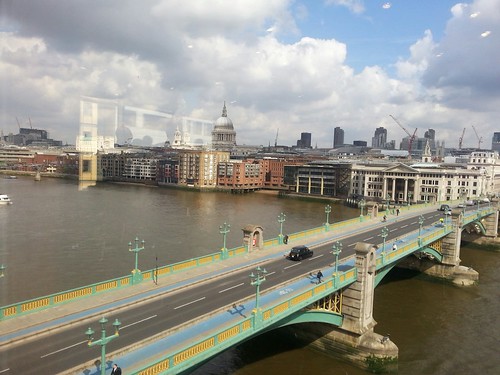
Today I went to City University's campus near Angel for the first time; and managed to forget any means of taking photos. Including my mobile. Given that the meeting was called Knowledge Organisation Goes Mobile, the irony was not lost on me. The first chance I've had for Tweeting smugly about a meeting I was in, and I blew it. And many of the lovely apps we were shown only work for iPhone too... But it's a lovely set of buildings, and a nice walk down from Angel. And my (very tasty, if strangely "fusion") food took too long to arrive at lunchtime, so the pub gave me a full (completely unasked-for) refund!
On the way home, caught the end of the new monthly artisan food market at King's Cross; picked up turkey pierogi, spicy kabanos, chicken bistilla (tonight's dinner and very delicious) and a Monmouthshire veal, lemon and thyme dried sausage, and headed for the train. Which was, just for a change, on time... Good day.
Like the view from this meeting in April - took me so long to work out how to get the photo off my camera, which was only a week old at the time, that I never posted it. We were in the Financial Times building next to Southwark Bridge.

Here's the other half of the view, with added St Paul's and window reflection.

Today I went to City University's campus near Angel for the first time; and managed to forget any means of taking photos. Including my mobile. Given that the meeting was called Knowledge Organisation Goes Mobile, the irony was not lost on me. The first chance I've had for Tweeting smugly about a meeting I was in, and I blew it. And many of the lovely apps we were shown only work for iPhone too... But it's a lovely set of buildings, and a nice walk down from Angel. And my (very tasty, if strangely "fusion") food took too long to arrive at lunchtime, so the pub gave me a full (completely unasked-for) refund!
On the way home, caught the end of the new monthly artisan food market at King's Cross; picked up turkey pierogi, spicy kabanos, chicken bistilla (tonight's dinner and very delicious) and a Monmouthshire veal, lemon and thyme dried sausage, and headed for the train. Which was, just for a change, on time... Good day.
Tuesday, November 04, 2014
NaBloPoMo day 4: Preparing for remembrance
One of the things I'm most impressed by in the new King's Cross is the theatricality of the space in the new concourse, and the way the lighting's used. All the way through Pride week, it was rainbows; over Christmas there's a tree but it's not horribly Chrismas-tastic; during the Olympics, the five colours of the Olympic rings were projected onto the roof.
This week, the theme's pretty obvious. The monument to the men of the GNR and LNER (itself a sensitive reworking of the previous memorial tablets) is in the old half of the station. The new has this (the poppy theme is carried on onto the new first-floor bridge which sweeps back into the old station):

Scattered around the station, and the adjoining Tube station, are boards with short poems such as the Remembrance ode from For the fallen, Here dead we lie and In Flanders fields.
For me, they're striking the right note.
This week, the theme's pretty obvious. The monument to the men of the GNR and LNER (itself a sensitive reworking of the previous memorial tablets) is in the old half of the station. The new has this (the poppy theme is carried on onto the new first-floor bridge which sweeps back into the old station):

Scattered around the station, and the adjoining Tube station, are boards with short poems such as the Remembrance ode from For the fallen, Here dead we lie and In Flanders fields.
For me, they're striking the right note.
Monday, November 03, 2014
NaBloPoMo day 3: Festiwool 2
So, Festiwool was lovely. An earlyish start, but Hitchin's only about an hour away even with a train change; friend Fran and I from the village met Rosie and Jackie, and managed to dodge the absolutely epic puddles on the short walk between the station and West Herts College. Once we got there, it was pretty clear where to go:

And yes, those are little bits of cycle-bunting on the railings - there was quite a lot more in evidence too; but there's more about that later this month.
The event was opened by Baldock's only supermodel (I suspect) Daphne Selfe. Ms Selfe is 85, but still impossibly elegant. You probably don't even need me to tell you that she's the one in the pea-green dress. I absolutely loved the nonchalance of her carrying her folding walking-stick in the pocket. We didn't see her doing the opening bit, but this was later just after the fashion show.
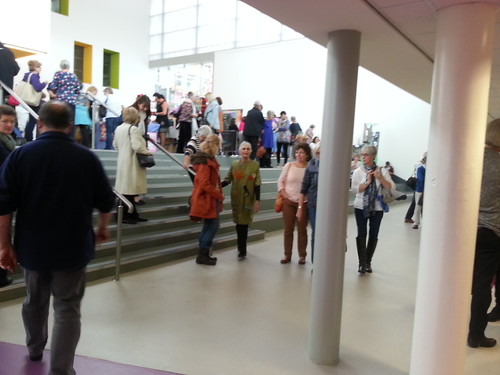
And this is possibly an even worse photo, overcropped and so on; but look at those cheekbones. Wonder if Kate Moss will still be strutting her stuff in 45 years time?
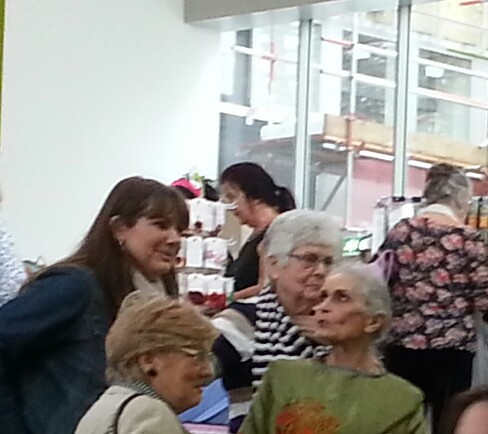
The halls filled up later - this photo was taken about 15 minutes after the doors opened - but the layout was such that you could always see things. There was a bit of a crush around the button stall, but that's the nature of button stalls...

Heather and Michael from Sparkleduck had a little bit of a chance to catch up with a friend...

And there was a knitted village, which I'd have missed but was situated next to the main ground-floor loos... Amazing detail.

There was fun-fur thatch, which really worked; and let's have a closer look at that Methodist chapel...

And because no festival account is complete without The Haul, here are pics (minus the two or three things I bought for gifts)
Buttons from Textile Garden (TG also have excellent mail order, but nothing beats being able to weigh buttons in your hand and work out whether they're substantial enough for your project). Metal ones for the NaKniSweMo cardi (the sleeve progress can be seen under the buttons), coconut-shell-that-look-like-leather ones for something To Be Decided. Maybe a felted bag.

Yarrrrnnnn. Left to right - Lang Mille Colori from Debonnaire, two skeins of Sparkleduck (grey is Pulsar in Town Mouse; sunsetty one is Galaxy in Darklands), a skein of Travelknitter high-twist merino in a colour called Dabbling Duck and a skein of DK from the bargain bin at Rosie's Moments. (And now I'm kicking myself - Travelknitter is Larissa, who I've talked to on Ravelry several times... gah.)

And my present to myself - even prettier in real life than they were on Wendy Fowler's website, and even better matched to my house...


All told - lovely day. The venue was brand-new, and there were stalls on two levels. There were loads of loos, and while I mistimed the food thing, there were lots of drinks and snacks available and I'd brought food having had the whole first-day-of-Yarndale experience. I really hope it's been an equally good experience for the suppliers and organisers, and that it's run again next year, perfectly timed for Christmas-gift-knitting buying.

And yes, those are little bits of cycle-bunting on the railings - there was quite a lot more in evidence too; but there's more about that later this month.
The event was opened by Baldock's only supermodel (I suspect) Daphne Selfe. Ms Selfe is 85, but still impossibly elegant. You probably don't even need me to tell you that she's the one in the pea-green dress. I absolutely loved the nonchalance of her carrying her folding walking-stick in the pocket. We didn't see her doing the opening bit, but this was later just after the fashion show.

And this is possibly an even worse photo, overcropped and so on; but look at those cheekbones. Wonder if Kate Moss will still be strutting her stuff in 45 years time?

The halls filled up later - this photo was taken about 15 minutes after the doors opened - but the layout was such that you could always see things. There was a bit of a crush around the button stall, but that's the nature of button stalls...

Heather and Michael from Sparkleduck had a little bit of a chance to catch up with a friend...

And there was a knitted village, which I'd have missed but was situated next to the main ground-floor loos... Amazing detail.

There was fun-fur thatch, which really worked; and let's have a closer look at that Methodist chapel...

And because no festival account is complete without The Haul, here are pics (minus the two or three things I bought for gifts)
Buttons from Textile Garden (TG also have excellent mail order, but nothing beats being able to weigh buttons in your hand and work out whether they're substantial enough for your project). Metal ones for the NaKniSweMo cardi (the sleeve progress can be seen under the buttons), coconut-shell-that-look-like-leather ones for something To Be Decided. Maybe a felted bag.

Yarrrrnnnn. Left to right - Lang Mille Colori from Debonnaire, two skeins of Sparkleduck (grey is Pulsar in Town Mouse; sunsetty one is Galaxy in Darklands), a skein of Travelknitter high-twist merino in a colour called Dabbling Duck and a skein of DK from the bargain bin at Rosie's Moments. (And now I'm kicking myself - Travelknitter is Larissa, who I've talked to on Ravelry several times... gah.)

And my present to myself - even prettier in real life than they were on Wendy Fowler's website, and even better matched to my house...


All told - lovely day. The venue was brand-new, and there were stalls on two levels. There were loads of loos, and while I mistimed the food thing, there were lots of drinks and snacks available and I'd brought food having had the whole first-day-of-Yarndale experience. I really hope it's been an equally good experience for the suppliers and organisers, and that it's run again next year, perfectly timed for Christmas-gift-knitting buying.
Sunday, November 02, 2014
NaBloPoMo day 2: Festiwool
Saturday, November 01, 2014
NaBloPoMo day 1: Statement of intent
The more observant, or frankly the not-dead, may have noticed that the name of this blog is a Trades Descriptions error in 2014. It's not been a great year; and I've been on social media a lot more than previously, possibly because being cheerful in 140 characters is easier...
But the clocks have gone back, and it's dark outside, and I need something to boot me into regular action... So I've signed up for this again
But the clocks have gone back, and it's dark outside, and I need something to boot me into regular action... So I've signed up for this again
Let's see what happens. It won't all be knitting - I'm hoping to remember some of the good things this year, most of which have some sort of fibre content - but I'm hoping there'll be a bit more of a textile thing going than there has been...
I've signed up for a couple of other things in November, too - for the first time, I'm going for NaKniSweMo - which is the equivalent of the National Novel-Writing Month which has been going for years. For the knitty version, I need to knit a sweater of more than 50,000 stitches in the month of November. Unlike the writing version - strapline The world needs your novel - nobody needs this sweater, or in fact cardigan, apart from me; but I could really do with a cardi for when autumn finally sorts itself out, and express-knitting one seems like a good idea. I already had the yarn for Burrard, bought from the lovely Aimée at Harbour Yarns when I was up there in August, so that was the one; it's neutral enough in colour that it'll wear with a lot of things. The yarn is softish but still definitely wool, and it's amazingly sheepy smelling, for a machine-washable wool/nylon blend (Aire Valley DK from West Yorkshire Spinners).
Here's Day 1's progress; 7,600 stitches; which doesn't actually get me much more than a third of the way to the armpits, so I'm going to have no problem hitting the 50,000 but may still not finish the sweater!
I'm envying slim and elfin people on the Ravelry group who are wondering whether to add long sleeves or collars to get the stitch count!
Tomorrow, I'm intending to get to my first Fibre Festival of 2014, Festiwool in Hitchin. I'll report back; not least on whether I see anyone knitting the way illustrated in the bottom right-hand photo in that link!
Sunday, October 26, 2014
2014 books, #81-85
Shots fired: tales from Joe Pickett country, by CJ Box. London: Head of Zeus, 2014.
Short stories from Box, written for different publications and collected here. Some fit into the gaps between Joe Pickett stories, like One-car bridge, a reaction to a bully; others explore Box's fascination with what "normal", everyday people will do when pushed to the limit by unbearable pressure. One I particularly liked was Pirates of Yellowstone, written for an anthology called Meeting across the river which asked for stories written around Bruce Springsteen's song of the same name; the characterisation struck me as just right for that song. I'm not the world's greatest short story fan, but if you like Box's longer-form fiction, you'll enjoy these and find something a bit different here.
A dark and twisted tide, by Sharon Bolton. London: Corgi, 2014.
A Lacey Flint novel. Lacey has left CID and become a Pc with the River Police; but trouble follows her wherever she goes. While free-swimming, dangerously, in the Thames near her houseboat in Deptford, she finds a body, shrouded and apparently recently freed from the depths of the river; and then strange things begin happening to her boat. Meanwhile Mark Joesbury also appears to be in difficulties with his latest undercover assignment, and Dana Tulloch has started on a life-changing path. Bolton looks at contemporary issues of immigration without judgment, while producing a tightly-written, gripping thriller. It'd be better to go back to the beginning of the Lacey series before reading this if you're averse to spoilers, but this book works very well on its own; and if you like books where London, and particularly the Thames, is a character, this is a great one.
Testament of youth: an autobiographical study of the years 1900-1925, by Vera Brittain. London: Virago, 2004. First published in 1933.
I first read this as a teenager, and was struck hard by the account of Brittain's time in the trenches and the physical horror of the injuries suffered by the troops. Reading it again for book group, and with a lot more information about those times, what upset me most about this account was the coming to terms after the War; both the enforced inability to speak about what had happened to her during that time, in an environment where everyone wanted to forget about it, and the awareness of those studying international relations that it wasn't over, and that a second war seemed all-but-inevitable even in the early 1920s. I don't think I'd registered the humour, either; or the distance Vera puts between her first love for Roland and having to come to terms with the rest of her life. I'm so glad I read this again, even if I cried most of the way through it; it's an astounding book and this was the right time to re-read it.
Worth dying for, by Lee Child [audiobook]. Read by Jeff Harding. Whitley Bay: Soundings, 2010.
After the events of 61 hours (last set of reviews) I ordered this one from the library quite quickly. Reacher is left at a crossroads miles away from anywhere, and finds his way to an isolated motel. The very drunk doctor next to him at the bar is called out by a patient; while he's reluctant to go, Reacher reminds him of his oath, and offers to drive. The patient turns out to be the wife of the young scion of the local ruling family, and she's obviously been beaten up... Inevitably, Reacher's walked into trouble again. Another really excellent Lee Child book; although the violence/compassion ratio in this one is slightly difficult to take.
Through a glass, darkly, by Donna Leon. London: Heinemann, 2006.
I think this is the first of the Brunetti novels I've read - it was given to me by a friend several years ago now, but I often end up reading library books rather than ones I own... Brunetti is called out by a colleague after the colleague's friend Marco is arrested during an environmental protest against the local large chemical plant; on the way out of the police station, Brunetti meets Marco's very angry father in law. When the man's wife gets in touch weeks later suggesting her father is threatening to kill Marco, Brunetti feels obliged to investigate; but it's not Marco's body which is later found. This investigation is set around the fornace (glass foundries) of Murano; it's interestingly plotted, and the Venetian setting is lovely. I'll have to read more of these.
Short stories from Box, written for different publications and collected here. Some fit into the gaps between Joe Pickett stories, like One-car bridge, a reaction to a bully; others explore Box's fascination with what "normal", everyday people will do when pushed to the limit by unbearable pressure. One I particularly liked was Pirates of Yellowstone, written for an anthology called Meeting across the river which asked for stories written around Bruce Springsteen's song of the same name; the characterisation struck me as just right for that song. I'm not the world's greatest short story fan, but if you like Box's longer-form fiction, you'll enjoy these and find something a bit different here.
A dark and twisted tide, by Sharon Bolton. London: Corgi, 2014.
A Lacey Flint novel. Lacey has left CID and become a Pc with the River Police; but trouble follows her wherever she goes. While free-swimming, dangerously, in the Thames near her houseboat in Deptford, she finds a body, shrouded and apparently recently freed from the depths of the river; and then strange things begin happening to her boat. Meanwhile Mark Joesbury also appears to be in difficulties with his latest undercover assignment, and Dana Tulloch has started on a life-changing path. Bolton looks at contemporary issues of immigration without judgment, while producing a tightly-written, gripping thriller. It'd be better to go back to the beginning of the Lacey series before reading this if you're averse to spoilers, but this book works very well on its own; and if you like books where London, and particularly the Thames, is a character, this is a great one.
Testament of youth: an autobiographical study of the years 1900-1925, by Vera Brittain. London: Virago, 2004. First published in 1933.
I first read this as a teenager, and was struck hard by the account of Brittain's time in the trenches and the physical horror of the injuries suffered by the troops. Reading it again for book group, and with a lot more information about those times, what upset me most about this account was the coming to terms after the War; both the enforced inability to speak about what had happened to her during that time, in an environment where everyone wanted to forget about it, and the awareness of those studying international relations that it wasn't over, and that a second war seemed all-but-inevitable even in the early 1920s. I don't think I'd registered the humour, either; or the distance Vera puts between her first love for Roland and having to come to terms with the rest of her life. I'm so glad I read this again, even if I cried most of the way through it; it's an astounding book and this was the right time to re-read it.
Worth dying for, by Lee Child [audiobook]. Read by Jeff Harding. Whitley Bay: Soundings, 2010.
After the events of 61 hours (last set of reviews) I ordered this one from the library quite quickly. Reacher is left at a crossroads miles away from anywhere, and finds his way to an isolated motel. The very drunk doctor next to him at the bar is called out by a patient; while he's reluctant to go, Reacher reminds him of his oath, and offers to drive. The patient turns out to be the wife of the young scion of the local ruling family, and she's obviously been beaten up... Inevitably, Reacher's walked into trouble again. Another really excellent Lee Child book; although the violence/compassion ratio in this one is slightly difficult to take.
Through a glass, darkly, by Donna Leon. London: Heinemann, 2006.
I think this is the first of the Brunetti novels I've read - it was given to me by a friend several years ago now, but I often end up reading library books rather than ones I own... Brunetti is called out by a colleague after the colleague's friend Marco is arrested during an environmental protest against the local large chemical plant; on the way out of the police station, Brunetti meets Marco's very angry father in law. When the man's wife gets in touch weeks later suggesting her father is threatening to kill Marco, Brunetti feels obliged to investigate; but it's not Marco's body which is later found. This investigation is set around the fornace (glass foundries) of Murano; it's interestingly plotted, and the Venetian setting is lovely. I'll have to read more of these.
Wednesday, October 08, 2014
2014 books, #76-80
61 hours, by Lee Child [audiobook]. Read by Jeff Harding. Whitley Bay: Soundings, 2010.
Jack Reacher is involved in a bus crash in a snowstorm in South Dakota. When the police finally arrive, Reacher's lack of luggage, and presence on a bus otherwise entirely occupied by pensioners on an out-of-season sightseeing holiday, attract their suspicion. They have two problems - they're guarding a witness in a drugs case round-the-clock but are also committed to leaving the town entirely unstaffed if there's an emergency at the local prison complex; and they have a strange abandoned military facility on the outskirts of town occupied by the biker gang which seems to be behind the drug supply. Once they find Reacher is ex-military, he's given the job of tracking down the original purpose of the facility. Of course, puting Reacher behind a desk and telling him to stay there never bodes well... Another excellent book, and the usual bang-up reading from Jeff Harding.
The table of less valued knights, by Marie Phillips. London: Jonathan Cape, 2014.
Marie Phillips is half of the writing team behind the wonderful Warhorses of letters, so this was bound to be a funny book. The Table of Less Valued Knights is definitely below the salt in Camelot - the table itself needs a dinner napkin wedged under one leg to keep it steady - but when a damsel in distress turns up late at the Pentecost Quest Dinner, Sir Humphrey du Val springs to the rescue; as does his half-giant squire Conrad, and Conrad's elephant Jemima. The lady Elaine turns out to be considerably less wet than "damsel in distress" would suggest; and is harbouring a secret. Meanwhile, the "official" quest is also not what it seems - and the two quests get horribly mixed up when Martha, Queen of Puddock, the goal of the original quest, ends up with Sir Humphrey's party. Someone who enjoys Terry Pratchett would love this book, but it's harder-edged at times, and with more sexual politics... Highly recommended.
The ocean at the end of the lane, by Neil Gaiman. London; Headline, 2013.
No idea why this has taken me This has taken me a year to read because it's an Actual Hardback I Paid For Myself, and those are rare things. I went to Mr G's wonderful reading/signing of this book at Ely Cathedral almost a year ago, and I've been saving it as a pleasure; and on the afternoon of 22 September I finally got round to reading it; in its entirety. It is wonderful. There's a frame, which is semi-autobiographical, I think (Gaiman's father died quite unexpectedly 18 months or so before this book appeared) and then a central story about a seven year old boy who is caught up in events of extraordinary evil and beauty. There's no point in telling you about the plot, because while that's the point, it's also not the point. Going to Neil Gaiman for his take on it. "[A] novel of childhood and memory. It's a story of magic, about the power of stories and how we face the darkness inside of each of us. It's about feat, and love, and death, and families. But, fundamentally, I hope, at its heart, it's a novel about survival". I'm incapable of being objective about Neil Gaiman's novels; but I suspect that's because they're just so bloody good.
Poppet, by Mo Hayder [audiobook]. Read by Jot Davies. Bath: AudioGO, 2013.
This is (thankfully) less grisly than some of Hayder's books, but no less suspenseful for that. Something, called The Maude, is causing mass terror in the Beechway Secure Unit; although psychiatric nurse AJ isn't superstitious, he still needs to know what's going on. After two unexplained deaths, he makes contact with Jack Caffery. Meanwhile Caffery is still looking for a body; and has an increasing suspicion as to where that body might be found. I guessed the twist in the tail of this book a little bit early, but the conclusion's no less chilling for that.
The resistance man, by Peter Walker [audiobook]. Read by Peter Noble. [S.l.]: Jammer, 2012.
Bruno is dealing with a spate of burglaries from cottages owned by summer visitors, which turn out to include a recently retired head of the UK Joint Intelligence Committee; the high-profile robbery brings down the Brigadier and Bruno's old flame Isabelle. The next burglary results in murder, and brings back unpleasant memories of an unresolved gay-bashing case from Bruno's very early years in St Denis... As ever, a fabulous mix of whimsy, a real grip on the tensions in the contemporary France profonde, and some excellent cooking. Highly recommended. Peter Noble's reading is pretty workmanlike, with the very occasional wince at the French pronunciation.
Jack Reacher is involved in a bus crash in a snowstorm in South Dakota. When the police finally arrive, Reacher's lack of luggage, and presence on a bus otherwise entirely occupied by pensioners on an out-of-season sightseeing holiday, attract their suspicion. They have two problems - they're guarding a witness in a drugs case round-the-clock but are also committed to leaving the town entirely unstaffed if there's an emergency at the local prison complex; and they have a strange abandoned military facility on the outskirts of town occupied by the biker gang which seems to be behind the drug supply. Once they find Reacher is ex-military, he's given the job of tracking down the original purpose of the facility. Of course, puting Reacher behind a desk and telling him to stay there never bodes well... Another excellent book, and the usual bang-up reading from Jeff Harding.
The table of less valued knights, by Marie Phillips. London: Jonathan Cape, 2014.
Marie Phillips is half of the writing team behind the wonderful Warhorses of letters, so this was bound to be a funny book. The Table of Less Valued Knights is definitely below the salt in Camelot - the table itself needs a dinner napkin wedged under one leg to keep it steady - but when a damsel in distress turns up late at the Pentecost Quest Dinner, Sir Humphrey du Val springs to the rescue; as does his half-giant squire Conrad, and Conrad's elephant Jemima. The lady Elaine turns out to be considerably less wet than "damsel in distress" would suggest; and is harbouring a secret. Meanwhile, the "official" quest is also not what it seems - and the two quests get horribly mixed up when Martha, Queen of Puddock, the goal of the original quest, ends up with Sir Humphrey's party. Someone who enjoys Terry Pratchett would love this book, but it's harder-edged at times, and with more sexual politics... Highly recommended.
The ocean at the end of the lane, by Neil Gaiman. London; Headline, 2013.
Poppet, by Mo Hayder [audiobook]. Read by Jot Davies. Bath: AudioGO, 2013.
This is (thankfully) less grisly than some of Hayder's books, but no less suspenseful for that. Something, called The Maude, is causing mass terror in the Beechway Secure Unit; although psychiatric nurse AJ isn't superstitious, he still needs to know what's going on. After two unexplained deaths, he makes contact with Jack Caffery. Meanwhile Caffery is still looking for a body; and has an increasing suspicion as to where that body might be found. I guessed the twist in the tail of this book a little bit early, but the conclusion's no less chilling for that.
The resistance man, by Peter Walker [audiobook]. Read by Peter Noble. [S.l.]: Jammer, 2012.
Bruno is dealing with a spate of burglaries from cottages owned by summer visitors, which turn out to include a recently retired head of the UK Joint Intelligence Committee; the high-profile robbery brings down the Brigadier and Bruno's old flame Isabelle. The next burglary results in murder, and brings back unpleasant memories of an unresolved gay-bashing case from Bruno's very early years in St Denis... As ever, a fabulous mix of whimsy, a real grip on the tensions in the contemporary France profonde, and some excellent cooking. Highly recommended. Peter Noble's reading is pretty workmanlike, with the very occasional wince at the French pronunciation.
Tuesday, September 23, 2014
Subscribe to:
Posts (Atom)






